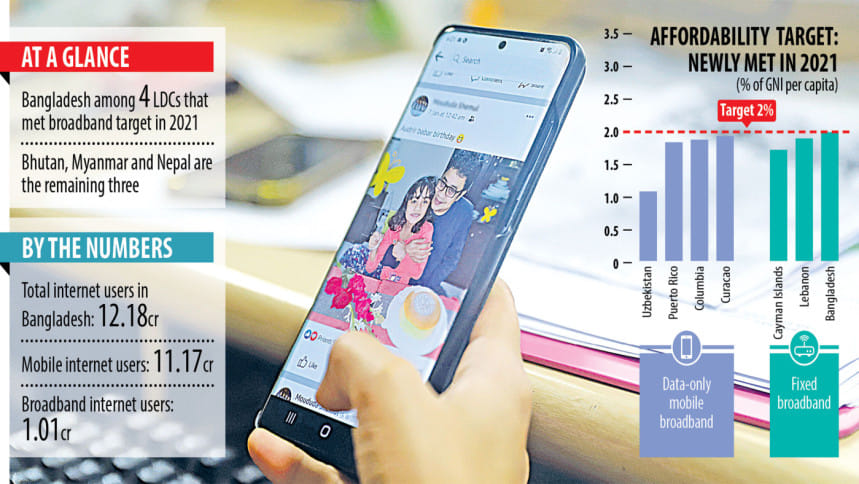Bangladesh meets UN target

Bangladesh has met the affordability target on internet prices set by the United Nations Broadband Commission for Sustainable Development in 2021.
The information was revealed in a recent report of the International Telecommunication Union (ITU) and the Alliance for Affordable Internet, giving a high-level overview of the results from the 2021 price data collection exercise, focusing on changes in affordability.
In 2018, the commission set its updated affordability target: to bring prices for entry-level broadband services below 2 per cent of the average monthly gross national income per capita by 2025.
According to the report, among the economies for which data were available for both 2020 and 2021, fewer met the affordability target in 2021 than in 2020.
Only 96 economies hit the goal with regard to the data-only mobile broadband basket in 2021, seven less than the previous year, and only 64 economies reached the target with respect to the fixed broadband basket, down by two from the previous year.
Bangladesh met the target of affordability for both broadband and mobile internet, according to the report.
The prices of broadband baskets remained far above the 2 per cent target for most of the least-developed countries (LDCs). Of the 18 economies where mobile broadband internet access cost more than 10 per cent of GNI per capita, 16 were LDCs.
Only four LDCs – Bangladesh, Bhutan, Myanmar and Nepal – met the broadband target in 2021.
Bhutan and Myanmar achieved the goal thanks to the affordability of data-only mobile broadband and Nepal due to fixed broadband.
Mustafa Jabbar, telecom minister, applauded the achievement, saying the government's decision to fix broadband prices played a crucial role in lowering internet prices.
In June last year, the Bangladesh Telecommunication Regulatory Commission (BTRC) fixed the monthly cost of a connection with a minimum speed of 5 Mbps at Tk 500, 10 Mbps at Tk 800-1,000, and 20 Mbps at Tk 1,100 -1,200.
Bangladesh had 7.5 lakh internet users in 2008 and it stands at 12.18 crore now.
The price of data was Tk 2,700 per Mbps in 2008 whereas 5 Mbps internet data now costs Tk 500.
Asked about the slow internet speed that irked customers, the minister acknowledged the speed of mobile internet is not up to the mark and blamed inadequate spectrum at operators' level.
There will be a spectrum auction on March 31 and operators should avail enough spectrum to ensure quality service, he added.
In a recent interview, Kaan Terzioğlu, group chief executive officer of Banglalink's parent company Veon, said Bangladesh's consumers enjoy one of the lowest internet prices in the world.
Bangladesh has continued to witness a rise in the number of broadband connections, while mobile operators have lost internet subscribers in recent months.
The number of mobile internet subscribers dropped 1.7 per cent month-on-month in January to 11.17 crore, BTRC data showed. However, on a year-on-year basis, the number of mobile internet users rose 8.34 per cent in January.
The number of broadband subscribers rose by 10,000 month-on-month in the month to 10.10 crore and was up 5 per cent year-on-year.
Since the pandemic reached on the shores of Bangladesh, the mobile operators and internet service providers added around two crore customers.
Md Emdadul Hoque, president of the Internet Service Providers Association of Bangladesh, credited the smooth bandwidth supply from Bangladesh Submarine Cable Company and international internet gateway service providers and reasonable prices for the affordable internet in the country.
Sumon Ahmed Sabir, an ICT and telecommunication expert, said internet prices in Bangladesh are less than in many countries, but there are complaints about speed and performance.
"In order to improve the quality of mobile internet, operators should take steps and regulators should come forward with policy support."
According to him, there are too many internet service providers for broadband connections in the country and some customers are getting quality service, while some are being deprived of it.
"However, the service quality is improving day by day," he added.

 For all latest news, follow The Daily Star's Google News channel.
For all latest news, follow The Daily Star's Google News channel. 








Comments